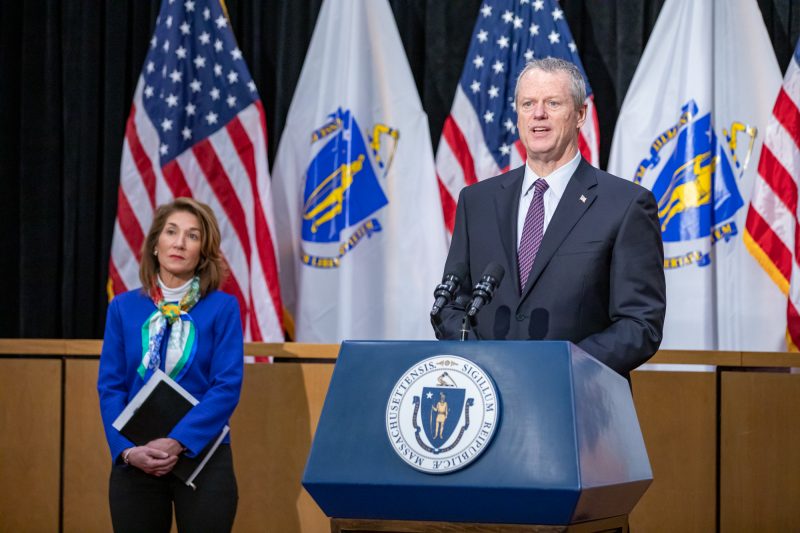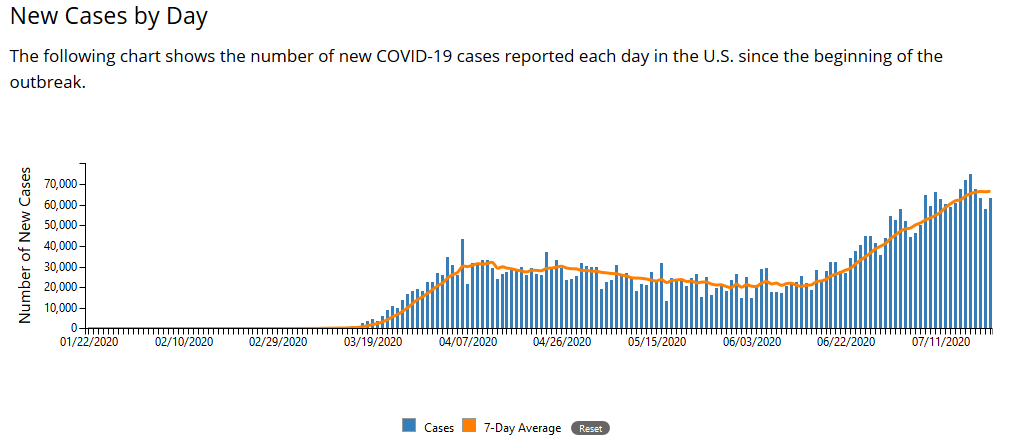Community
Massachusetts COVID-19 hospitalizations up for 2nd day in a row, Baker awards $3 million in COVID-19 food funds

Massachusetts saw an increase in hospitalizations for the 2nd day in a row in Wednesday’s COVID-19 report.
Massachusetts has seen 192 more positive cases announced in the last 24 hours. An increase from the previous 24 hour period.
The Massachusetts Department of Health statistics show a rise in total cases to 107,413 with 18 more reported dead for a total of 8,249.
Massachusetts had seen 165 more positive cases in the previous 24 hour period.
10,786 tests were performed, almost 3,000 more than yesterday, to increase the overall total to 1,369,551. The amount of individuals tested is 1,063,155.
Hospitalizations have decreased in 60 of the last 73 days to 532 total despite today’s increase.
covid-19-dashboard-7-22-2020
Nursing home cases and cases by City and Town as of July 22nd.
Weekly COVID-19 Public Health Report
Massachusetts residents subject to COVID-19 quarantine by current status up to July 22nd
• Total of individuals subject to quarantine: 72,481
• Total of individuals who have completed monitoring (no longer in quarantine): 70,449
• Total of individuals currently undergoing monitoring/under quarantine: 2,032
According to the CDC, as of July 22nd, the total amount of COVID-19 cases in the country is 3,882,167 with 141,677 dead.

In related news, today, the Baker-Polito Administration announced nearly $3 million in grants to address urgent food insecurity for Massachusetts residents as a result of the COVID-19 pandemic and make the Commonwealth’s food system more resilient. This funding is being awarded as part of the first round of the new $36 million Food Security Infrastructure Grant Program, created following recommendations from the Administration’s COVID-19 Command Center’s Food Security Task Force, which promotes ongoing efforts to ensure that individuals and families throughout the Commonwealth have access to healthy, local food.
The Administration also announced the first round of new vendors for the Healthy Incentives Program (HIP), funded through $5 million in additional funds recommended by the Food Security Task Force. Thirty-nine new vendors were selected based on their ability to respond to the needs of populations and communities most significantly impacted by the pandemic including communities of color and older adults, serve areas designated as food deserts or low-access areas, and reach SNAP client populations disproportionally impacted by COVID-19.
“During this pandemic, Massachusetts’ food supply chain has faced significant challenges and there is an urgent need for food security to support our most vulnerable residents,” said Governor Charlie Baker. “This new funding is a $3 million investment in the infrastructure we need to continue to respond to the impacts of the pandemic, while creating a system that provides more equitable access to nutritious, local food in the Commonwealth.”
“Increasing food security and the resiliency of our food system is essential to protecting public health and local jobs,” said Lieutenant Governor Karyn Polito. “Our Administration’s new grant program will help ensure the Commonwealth’s farmers, fishermen, food banks, and other food businesses can continue contributing to our economy and connect fresh, local food with Massachusetts residents.”
The Food Insecurity Infrastructure Grant Program was announced in May 2020 as part of a $56 million investment by the Baker-Polito Administration to combat urgent food insecurity for Massachusetts families and individuals as a result of COVID-19. The Administration also announced $12 million for the provision of 25,000 family food boxes per week through a regional food supply system, and $3 million in funding as an immediate relief valve to food banks.
“The Command Center’s Food Security Task Force has been pursuing strategic investments to bolster the food system and provide emergency supplies to meet residents’ immediate needs,” said COVID-19 Command Center Director and Health and Human Services Secretary Marylou Sudders. “These investments are targeted to support organizations across the Commonwealth in producing and supplying food to communities in need, and will help strengthen the system that has been strained by the COVID-19 pandemic, and beyond.”
“This ongoing crisis has highlighted the importance of ensuring that the food grown and produced here in Massachusetts reaches all our residents, especially vulnerable populations and those struggling with food insecurity,” said Energy and Environmental Affairs Secretary Kathleen Theoharides. “This grant program provides a great opportunity to strengthen our diverse food system, allow for greater access to local food in a way that supports customer and worker safety, and address systemic inequities around access to fresh, local food.”
“The COVID-19 pandemic has highlighted the strengths and weaknesses of the food system,” said Department of Agricultural Resources Commissioner John Lebeaux. “These Food Security Infrastructure Grants will help to strengthen the resiliency of Massachusetts’ farmers and fishers, and better connect locally grown and produced food products with the Commonwealth residents most underserved by healthy, fresh food options.”
The Administration today also launched a food assistance decision tree, to help residents in need determine which programs they might be eligible for. This tool can be accessed at mass.gov/findfoodhelp.
Food Security Infrastructure Grant Program
The goal of the Food Security Infrastructure Grant Program is to ensure that individuals and families throughout the Commonwealth have access to food, with a focus on food that is produced locally and equitable access to food. The program also seeks to ensure that farmers, fisherman and other local food producers are better connected to a strong, resilient food system to help mitigate future food supply and distribution disruption.
The first round of the grant program includes 26 awards totaling $2,941,838 to fund investments in technology, equipment, increased capacity, and other assistance to help producers distribute food, especially to food insecure communities. When evaluating the applications, considerations included equity, economic impact and need, sustainability and scalability of efforts, and ability to support producer readiness to accept SNAP and HIP benefits.
Applications will continue to be evaluated on a rolling basis through September 15, 2020. Eligible grantees include entities that are part of the Massachusetts local food system including production, processing and distribution, the emergency food distribution network, Buy Local, community and food organizations, school meal programming, urban farms and community gardens, non-profits, and organizations that provide business planning, technical assistance and information technology services.
-

 Community6 years ago
Community6 years agoNational Shrine of La Salette Festival of Lights 2017 set to begin
-

 Community6 years ago
Community6 years agoMassachusetts State Police looking for good home for retired dogs
-

 Crime6 years ago
Crime6 years agoFall River ranked most dangerous city in Massachusetts according to report
-

 latest6 years ago
latest6 years agoDurfee student allegedly overdoses on marijuana
-

 Community6 years ago
Community6 years agoVideo of Fall River Police goes viral
-

 Causes6 years ago
Causes6 years agoMissing Fall River woman found deceased
-

 Crime6 years ago
Crime6 years agoFall River Police add names to most wanted list
-

 Causes6 years ago
Causes6 years agoFall River teenager reported missing has been found




